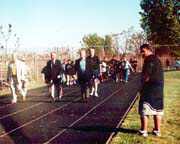For about an hour on May 4, Hudson County defied its usual political logic when the two contenders in the hotly-contested county executive Democratic primary race set aside their differences and strolled around the running track at Secaucus High School as part of the opening festivities for the Hudson County Special Olympics.
“This is something beyond politics,” said Tom DeGise, who is opposing Bernard Hartnett in the June 4 primary. “This is about helping people with special needs.”
Hartnett, who joined DeGise, Secaucus Mayor Dennis Elwell and others at the event, said programs such as these are necessary for helping people with disabilities adjust to society.
“Hartnett and DeGise showed a quality of civility that would make people think that there was no election going on,” said Richard Dwyer, an employee of PSE&G, who has been deeply involved in the program. “They rose above politics to help with a good cause.”
Both DeGise and Hartnett understand the special requirements of special needs people, since both have struggled over the years to help members in their own families.
“When you have a child who’s special, you begin to understand the importance of programs like these,” said DeGise, who had been active in providing programs for years and helped maintain some of them in Jersey City while he was president of the Jersey City Council. Indeed, Jersey City has routinely hosted the Special Olympics over the years in Lincoln Park.
He said parents of special needs kids get deeply involved in helping these programs because of the different challenges their kids face.
“Volunteers who help in those programs are the salt of the earth,” he said. “They understand what goes on, but they often don’t get the recognition they deserve.”
Dywer is one of those generous volunteers, who played the role of public announcer during this year’s events, although he said he would do just about anything to make the program work.
Hartnett, in his capacity as county executive, read a proclamation naming May 4 Special Olympic Day in Hudson County.
Secaucus Mayor Dennis Elwell, in his statements opening the festivities, said that even before the event began, he saw only winners.
“These are amazing people,” he said in an interview later, although others involved in the events said the Elwell administration has been particularly helpful in providing programs for special needs people. For the last two and half years, James Adams – who works for the town officially as its grants writer – has run sports programs at the Centre Avenue Recreation Center.
Adams, who several people say is another key person in providing programs for special needs kids in Hudson County, said that about 350 athletes from all over Hudson County participated. Winners of these events moved onto state championships held at The College of New Jersey in Trenton in June.
“It takes 10 weeks of training to get to this,” Adams said.
Adams said these events go beyond sports by providing these kids with an education in cultural exchange and social interaction.
Adams said Dywer, DeGise, Hartnett, Mayor Elwell, as well as the Secaucus superintendent of schools, superintendent of public works, the Jersey City Education Association, Tom Favia, and Jack Leahy all helped make this program possible.
“But there is a definite need to develop more programs throughout the municipalities and county that enhance opportunities for special needs students,” he said. “We’re seeking more participation from school districts, and municipal recreation departments run programs throughout the year and run local training programs for the Special Olympics.”
The Special Olympics is an international organization dedicated to empowering individuals with mental retardation, allowing them to become physically fit, productive and respected members of society through sports training and competition. The Special Olympics began in 1968 when Eunice Kennedy Shriver organized the First International Special Olympics Games at Soldier Field in Chicago, Illinois. The concept had been born in the early 1960s when Shriver started a day camp for people with mental retardation. She saw that these people were far more capable in sports and physical activities than many experts thought.
“Since the first Special Olympics were held in 1968, many physically impaired people have had the opportunity to participate in athletic competition,” Hartnett said. “This has provided these special athletes the chance to develop physical fitness, demonstrate courage, experience joy and build self esteem.”
“The Special Olympics is sports in its truest sense. The goal is not only to win, but to try,” Hartnett said.
